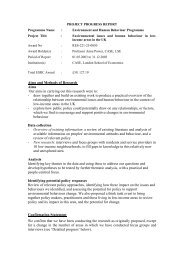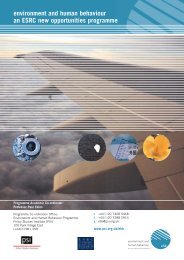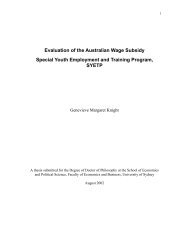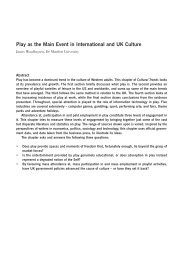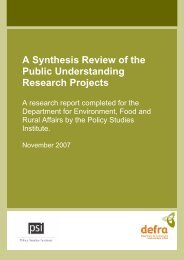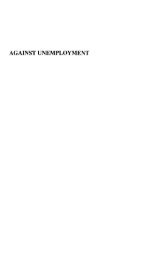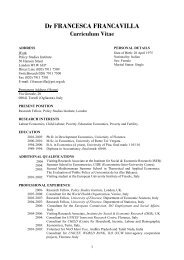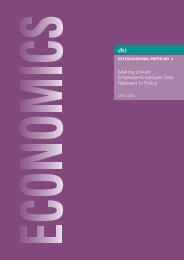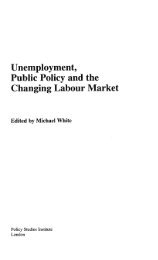Annual progress report - 2003 (pdf format) - Policy Studies Institute
Annual progress report - 2003 (pdf format) - Policy Studies Institute
Annual progress report - 2003 (pdf format) - Policy Studies Institute
Create successful ePaper yourself
Turn your PDF publications into a flip-book with our unique Google optimized e-Paper software.
In addition, as of the end of December, seven semi-structured interviews have been conducted with<br />
key actors involved in the 1953, 1998 and 2000 floods. These informants were either centrally<br />
involved in the policy negotiation process or known to be knowledgeable of the flood hazard context,<br />
policy changes and/or the policy negotiations that occurred. No such actor was available for the 1947<br />
flood.<br />
Confirmation Statement: (one paragraph confirming that research is being conducted as<br />
anticipated in the initial contract with ESRC or as subsequently<br />
agreed)<br />
I can confirm that the research has been conducted in accordance with contract. Where this has<br />
deviated slightly is in the theoretical developments associated with the project. By including a broad<br />
theoretical understanding of the public policy and policy change literature, this has greatly enhanced<br />
our understanding of the relationship between 'floods as crises' and changing policy. The actororiented<br />
literature, which formed part of the original proposal, would not have been appropriate in this<br />
context.<br />
Highlights of the Research<br />
and Important Findings: (max 1 page, referring to period of the <strong>report</strong>)<br />
Research highlight: The impact of flood crises on long-term policy transition<br />
The tied relationship between major floods and the demand by the public for a policy response is well<br />
known (Parker, 2000; Tobin and Montz, 1997). However, what is not well known, is how and why<br />
particular policy ideas emerge as policy change during certain contexts and crises, whilst others<br />
remain in the 'policy-option pool'. By combining the extensive and applied research history in the<br />
flood hazard and public policy research domains, with the detailed analysis of four case studies, this<br />
project has augmented our theoretical understanding of the policy process in the flood hazard context.<br />
The highlight of which is the fulfilment of the project objective: the development of a new analytical<br />
model exploring the impact of flood crises on long-term policy transition.<br />
As with all modelled relationships this is a simplification of the complex relationships between human<br />
behaviour and the environment. However, based on the theoretical insights gained in this project, and<br />
the case studies evaluated, the model is thought to be an important contribution to our understanding<br />
of the relationships between key behavioural, contextual and environmental factors which, in<br />
combination, influence policy as a result of crises. In this way, recognising the interaction between<br />
these variables, and the dominance of certain relationships and variables over others, it offers the<br />
potential to provide insight into, or signals of, the kinds of policy changes which might occur as a<br />
result of future crises.<br />
Important findings<br />
Aim 1: The influence of major floods on changes in public policy<br />
All four of the floods investigated resulted in changes in policy towards the flood hazard. However, in<br />
all but one example, (the Storm Tide Warning System that emerged from the 1953 flood), these<br />
changes did not reflect any 'new' policy ideas or fundamental changes in policy direction. Rather, the<br />
floods served to act as a catalyst for increasing the rate at which a policy idea, already under<br />
consideration prior to the flood, was given prominence and acted upon. In addition, our findings<br />
suggest that it is not just the major floods investigated that have acted as catalysts for changing policy,<br />
some minor floods can also be seen to have been influential in changing policy.



